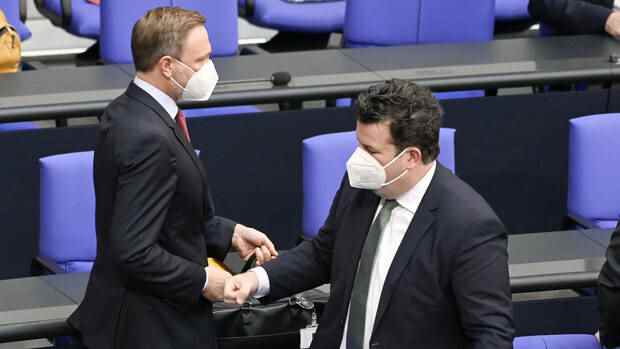The debt brake is likely to cause a considerable dispute at the traffic lights – especially if other social democrats agree with the statements made by the Minister of Labor.
(Photo: Imago Images)
Berlin The internal government dispute over the debt brake is coming to a head. At the weekend, Federal Labor Minister Hubertus Heil (SPD) was the first member of the Social Democrats’ cabinet to question whether the debt rule could be adhered to regularly in the coming year. “If we slide into a massive recession, the question of whether the debt brake should be complied with must be reassessed in the coalition,” said Heil of the OM media group.
The answer from Federal Minister of Finance Christian Lindner followed promptly. “The debt brake is set,” he wrote via Twitter. His chief economic advisor Lars Feld told the Handelsblatt: “In order for the exceptional rule of the debt brake to be used again for 2023, conditions must be met that are currently not available.” There is enough buffer in budget planning.
The recent debate was driven by announcements by Federal Chancellor Olaf Scholz (SPD) on Friday that he would introduce new relief for citizens and companies due to the high energy prices.
At the beginning of July, the federal cabinet jointly approved Lindner’s draft budget, which provides for compliance with the debt brake. But the budget has to go through Parliament in November. In particular, the Greens around co-party leader Omid Nouripour have already questioned whether the cabinet decision would still be worth anything.
Top jobs of the day
Find the best jobs now and
be notified by email.
The topic is likely to cause considerable controversy in traffic lights – especially if other Social Democrats agree with the statements made by Labor Minister Heil. Chancellor Scholz pushed the topic aside on Friday. He assumes “that we have the financial leeway that we need”.
Tight financial framework for 2023
The debt brake, which has been enshrined in the Basic Law since 2011, limits the federal government’s net borrowing to 0.35 percent of gross domestic product. In “extraordinary emergency situations” the Bundestag can make use of a clause that allows significantly higher loans to combat the crisis. The clause was already drawn in 2020 and 2021 because of the corona pandemic and in 2022 because of the Ukraine war.
The financial framework for 2023 is tight. Above all, the energy-reliefs squeeze the margin. Traffic light measures such as the nine-euro ticket or payments to social welfare recipients have cost around 29 billion euros in the current year. But in view of the foreseeable further increases in gas costs, these will hardly be sufficient.
The gas suppliers should be able to pass on cost increases to their customers. From October, possibly as early as September, Uniper and Co. are to pass on 90 percent of the costs they incur because they have to procure expensive replacements for Russian gas supplies. This should then be passed on to all gas consumers.
“That can be two cents per kilowatt hour. But that can also be a higher amount, ”said Scholz. The levy burdens a family of four with 200 to 300 euros per year.
That is not so high that the relief cannot be financed with the debt brake, according to finance ministry circles. But that is not consensus in the traffic light. “We must not stall politics with the debt brake,” said Greens parliamentary group leader Andreas Audretsch.
Housing benefit reform and longer business support planned
The federal government wants to relieve the burden in several ways. The focus is on a reform of the housing benefit. Scholz announced that the circle of beneficiaries would be expanded at the turn of the year. The government is also planning to introduce a flat-rate heating fee.
The reorganization of unemployment benefits should also relieve the burden. Minister of Labor Heil presented plans for this last week. Accordingly, the standard rates should “rise appropriately”. The government is also examining ways to protect tenants from payment defaults in the event of particularly high energy costs. The government also wants to extend business aid.
>> Read here: The big budget bang – now the debt illusion is bursting
In addition, Scholz announced further relief that should result from the “concerted action”. The informal round of talks between politicians, employers and trade unions will meet in mid-September. There are enough wishes. The Protestant welfare association Diakonie, for example, proposes a crisis surcharge of at least 100 euros for recipients of basic security or housing benefit for a period of six months.
The government also wants to look at the design of corporate aid. This is also necessary, says Peter Adrian, President of the Association of German Chambers of Industry and Commerce (DIHK): “In addition to electricity-intensive companies, those that consume a lot of gas must also be taken into account.”
More: How Germany can invest 600 billion euros without taking on debt

